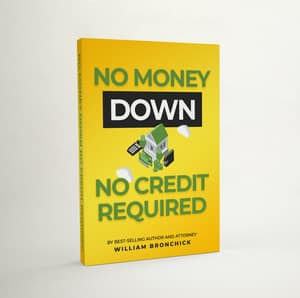By Frank Pulley & William Bronchick, Esq.
Why does it seem that other folks can get a loan for their investment property with seemingly little effort when others try repeatedly without success? We all know that properties can be purchased using a variety of Creative Financing techniques, but sooner or later, if you are active in this business, you will need to apply for a loan from a bank. If you are applying for a private (aka Hard Money) loan, the requirements may not be quite as stringent, but these principles will still apply.
This article is slanted towards the real estate investor, but these tips can also be used when you are buying a primary residence or even doing a refi.
- Know Your Credit Score Before You Apply. Lenders base in part, (a big part by the way) your credit score, whether they will even loan you the money and at what rate. The lower your credit score, the higher your rate. Some lenders will lend with a credit score in the upper 500’s to lower 600’s but you will pay a much higher rate as they will look at you as more of a risk. Having a FICO score above 720-750 depending on the lender will normally get you the best rates. The difference of 1% on your interest rate can be staggering.
Check your score using one of the major credit scoring companies like Experian, Equifax, or Transunion. You can also monitor changes in your score using an app like Credit Karma. They will also give suggestions on how to improve your score.
- Know What Type of Loan You Need and What the Down Payment Requirement Will Be. Various types of investment properties will likely require different types of loans. For primary residences, one will normally use an FHA, VA, or Conventional type loan. For investment properties, Conventional Loans, Fannie Mae, and some FHA products may do the job. Some real estate investors will use a combination of a short-term hard money loan, along with a long-term 15 or 30-year loan. This is where having the advice of a trusted advisor or mentor can come into play, along with having connections with a savvy mortgage broker for direction. Each of these loans has different required down payments ranging from 3% to over 30%. It is important to know what these amounts will be going in.
- Shop Around. Once you know your credit score, and have an idea of what type of loan you are looking for, then you should shop around to see what rates each lender or mortgage broker can offer. Don’t apply yet but check to see who has the best rates, based on your credit score, and then you can investigate further.
Also, check into the lenders’ requirements for you to have the best chance at success when getting the loan. Also, some lenders specialize in working with real estate investors. They might be a good choice to start with. Joining a local real estate investing club will likely get you some good recommendations on these lenders.
- Know Your Budget and What You Can Afford. Lenders will look at your income and then they will look at your bills. They use a DTI (Debt to Income) ratio to determine if you will be able to afford the monthly payments on the loan you are applying for. They divide your total monthly payments by your monthly gross income. A DTI of less than 36% is normally considered acceptable but some government loans may allow DTIs in the 41-43% range. The lower the better!
- Reveal Everything on Your Loan Application. Your loan application will ask several things as far as bills, income from all sources, late payments, foreclosures, etc. DON’T try to lie or “fudge” the facts or numbers. The lender will find out if you have a few skeletons in your credit closet and now you have a credibility problem. Better to talk to your mortgage broker in advance of applying and let them know upfront of any issues. Be totally honest. This way they can suggest the right loan or give you some suggestions to work on to your credit to increase your chances of success. Remember, they make a good profit from lending you money so allow them to help you! If you want to see what a loan application may look like, you can google 1003 Loan Application and it will show you what one of those looks like and the information the lenders will likely want.
- Have Income/Assets/Savings. Not every investor will have a lot of savings, assets, or savings. If you get a good enough deal on a property that will make things a bit easier too. However, the better you look in these categories the easier it is to get a loan. Building savings and assets is normally a long-term goal you should shoot for.
As far as income, the trick is to make as much money as possible to show the bank but appear as broke as possible in case of a lawsuit or something similar. The fact is you must show some income. This is where a good accountant, mentor or trusted advisor can be worth their weight in gold.
- Pay Down Debt if You Can. The less debt you have, the better your DTI looks. If it is possible to use some savings or sell some items, then pay down the debt. If you have a good savings account, then using some of that to pay down high-interest credit card debt might be a smart idea. In some cases, if there is enough equity in the property you are getting the loan on, the lender might “roll” some of that debt into your loan.
- Don’t Take on New Debt if Possible. This can be the kiss of death to a loan. Some of our realtor friends can tell you horror stories of a person that decides to buy a new vehicle right before closing on a property as they wrongfully think that because they have been approved for the loan, they are ok. Most lenders will do a credit check on you a few days before closing, so if things have changed, you might get your loan and closing denied.
- Build a Relationship with Your Loan Officer and Underwriter if You Can. In this day of electronic docs, portals, emails, and such, this is easier said than done. In most cases, though you can either email or call each of these folks if need be. One of the best ways to build goodwill with these people is to respond quickly to their requests! We gave you a way to access the information requested on the 1003 Loan Application in Item #5. This should give you a good idea of what documents, facts, and figures, you should be gathering to apply. In addition, most lenders will give you a list once you have a preliminary call with them. If you are an investor, you should keep these docs readily accessible on your computer, so you don’t have to repeat the process of gathering information and documents if applying for more than one loan in a 12-month period.
Some of the docs you will have to have to submit to your lender are the last 3 years income taxes including any S-Corps or LLCs you may have. Also, they will require proof of any sources of income including W-2, retirement, mortgage statements, insurance policies, investments, etc. The lender may also ask for copies of leases if you have some rental properties. They also may ask for P& Ls on your entities so its best to keep your bookkeeping current.
- Get Pre-Approved Not Prequalified. If you are looking to buy properties, then the seller or realtor will likely either ask you for either a Pre -Approval Letter or Proof of Funds. This is so they don’t waste their time; or yours, showing you properties that you can’t possibly afford. A Prequalification letter, also known as a Prequal, isn’t worth much as it states that “you can qualify for a loan up to a certain amount if what you told the lender is true.” A Pre-Approval Letter, on the other hand, is based on information that you gave to the lender and they have documented that this information is true. Thus, a Pre-Approval letter caries a lot more weight than a Prequal. If you want to be viewed as a serious buyer, then the Pre-Approval is the way to go.
There it is in a nutshell. Having the pre-required docs on hand and being proactive and upfront with your lender will get you to where you want to go a lot faster. Having connections such as a mentor or trusted advisor can also keep you on the straight and narrow.
Free eBook on how to purchase properties with no money down! Click Here!

